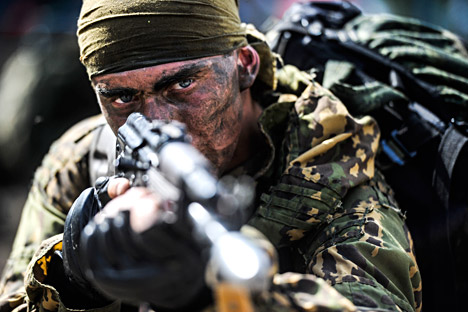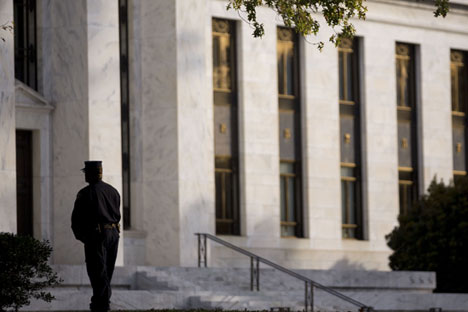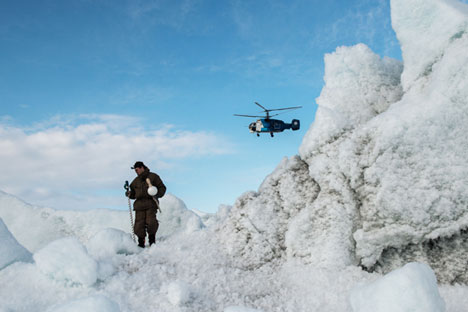Press Digest: Will Russian troops fight in anti-ISIS operations in Syria?

Photo caption: Russian President Vladimir Putin says it is premature to talk about Russia taking part in military operations against ISIS. Source: Yevgeny Kurskov/TASS
Yevgeny Kurskov/TASSDiscussion of Russian military involvement in Syria growing
Russian President Vladimir Putin will announce his plan of action for assistance to Syria at the UN General Assembly, reports the centrist daily Nezavisimaya Gazeta. Washington is concerned about the possible strengthening of the Russian military presence on the side of President Bashar al-Assad in Syria.
Lately, there have been a lot of articles in the Western media confirming the presence of the Russian military and the latest Russian weapons in Syria. Putin, however, has declined all reports.
In this regard, U.S. Secretary of State John Kerry called Russian Foreign Minister Sergei Lavrov on Sept. 5, and they agreed to continue the debate on Syria on the sidelines of the 70th session of the UN General Assembly, to be held on Sept. 15-22.
Putin is also scheduled to speak there, with Russia planning to announce its plan for resolving the situation in Syria. In particular, the UN Security Council will be invited to consider the initiative to create a coalition against Islamic State (ISIS) militant radicals, who have taken control of large swathes of Syrian territory.
Meanwhile, in an interview with media representatives on Sept. 4, Putin stressed that it is premature to talk about Russia taking part in military operations against ISIS.
“We will hold consultations with both our Syrian friends, and with the countries of the region,” he said.
U.S. concerns about Russia's military activities in the Middle East are understandable. The Pentagon had already planned to bomb Assad’s troops, but the possible presence of the Russian military in the combat forces of the Syrian army rules out such a scenario.
Price of Russian gas to fall by a third
Due to the fall in oil prices, Russian gas beginning to go down in price, as the cost of Gazprom's long-term contracts is linked to oil prices, the news website Gazeta.ru reports.
Experts estimate that the price of gas will drop by almost 30 percent by the end of the year.
Konstantin Simonov, head of the National Energy Security Fund, says that gas prices change after oil with a lag of four to eight months (depending on the gas contract).
“Tentatively speaking, if oil prices plummeted in August, then in January, European consumers will receive Russian gas at a price lower by the same percentage as the drop in price of a barrel,” he said.
According to Mikhail Korchemkin, head of East European Gas Analysis, with oil price of $45-$50 per barrel, the average price of 1,000 cubic meters of Russian gas in Europe in the fourth quarter of this year will fall to $180, and in the first quarter of 2016 – down to $170.
“In the end, Gazprom will have to show a big loss,” said Korchemkin.
This may force Gazprom to give in to Europe, which for a long time has demanded that the gas giant untie its pricing from oil and base it on spot contracts for European gas hubs, say experts.
Asylum not for everyone: How migration crisis splits Europe
The influx of refugees has intensified feelings in Europe both among those in favor of closing the borders and citizens who are ready to help migrants, Olga Gulina, director of the Migration Policy Institute in Berlin writes in the Russian edition of Forbes magazine.
On the one hand, the people of Europe, as well as the majority of ordinary Russians, prefer measured life without shocks and changes. But the anti-migrant rhetoric of politicians and the media do not create a favorable environment for this. Consequently, right-wing parties have intensified their resistance in a number of EU member states, writes Gulina.
In Germany, the police have reported more than 500 attacks on refugee centers in the first half of 2015, while in the Netherlands, the Dutch prime minister announced the need to close 30 regional centers for accommodation of refugees.
On the other hand, the internet has become a point of unity and the beginning of civil initiatives in many countries.
A German family from Berlin has created a webpage on which everyone can offer a free room in their home to accommodate refugees. Meanwhile, the internet community London2Calais has set up a distribution center for clothes, toiletries and food, enlisting the services of drivers carrying goods through the Channel Tunnel to a refugee camp in Calais, France on a daily basis.
However, all these civil initiatives are only a drop in the ocean of the problems caused by the sudden influx of migrants, which cannot be solved only by the efforts of volunteers and humanitarian, social and non-governmental organizations. To solve and overcome them, the political will is needed, and that is where the complexity begins.
All rights reserved by Rossiyskaya Gazeta.
Subscribe
to our newsletter!
Get the week's best stories straight to your inbox

